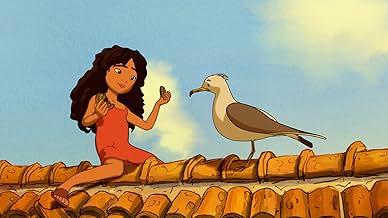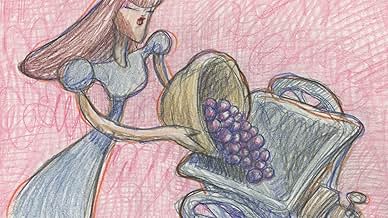Exiled artist and poet Mustafa embarks on a journey home with his housekeeper and her daughter; together the trio must evade the authorities who fear that the truth in Mustafa's words will i... Read allExiled artist and poet Mustafa embarks on a journey home with his housekeeper and her daughter; together the trio must evade the authorities who fear that the truth in Mustafa's words will incite rebellion.Exiled artist and poet Mustafa embarks on a journey home with his housekeeper and her daughter; together the trio must evade the authorities who fear that the truth in Mustafa's words will incite rebellion.
- Awards
- 1 win & 10 nominations total
- Mustafa
- (voice)
- Kamila
- (voice)
- (as Salma Hayek Pinault)
- Almitra
- (voice)
- Halim
- (voice)
- Pasha
- (voice)
- Sergeant
- (voice)
- Baker
- (voice)
- …
- Baker
- (voice)
- …
- Grocer
- (voice)
- …
- Orange Seller
- (voice)
- …
- Woman with Shawl
- (voice)
- …
- School Girl
- (voice)
- School Boy
- (voice)
- Bride's Mother
- (voice)
- …
- Female Guest #1
- (voice)
- Old Olive Man
- (voice)
- …
Featured reviews
Oh my .. i couldn't control my tears in the end of the film not that its emotional but the expression of truth always gets answered without the senses ... thanks to the director who felt in his heart to make Ghibran on the screen and i am debt to him my lifetime for just this...
The best presentation of Ghibran till date..
Truth is always ONE... it just takes our time to realize it, coz its always there and we just don't see it ...
The film attempts to tell the story of Mustafa, who is been on house arrest for seven years and is finally being released (deported back to his own country). The details of how he came to be in this other country are fuzzy, but it is clear that he is a poet, painter, and philosopher, and his ideologies have landed him in this bind. Mustafa befriends Almitra, who has stopped speaking since her father died a year ago. Almitra's mom does the housework for Mustafa under the (clumsy) watch of Halim (or Halil?) Everyone loves Mustafa. Townsfolk loves him. The cleaning lady and the kid love him. Even the guard loves him. There is a very clear distinction between good and evil here, which will appeal to younger children, and maybe not so much to the older crowd. So Mustafa is taken through the town (mistake!) to the boat that is supposed to take him back, but needless to say, things don't turn out that way at all. There is some strong imagery here (complete with a firing squad, but we only hear them fire).
I think most of the content is out of reach of most younger children. The stuff about love and life, about how parents do not own their children got through to the kids who were watching around me in the theater. I was surprised that even the youngest did not fall asleep, as some parts were just Mustafa speaking about stuff. I believe this s due to the amazing animation work by many great artists.
If Gibran's work does not interest you at all, I still would say this is a must see, if you like animation art. There's great stuff here. I dare say something for every taste and preference in terms of animation art.
All in all, it was a great film to see on the big screen. Animation was top notch and engaging (as the kids around me proved it). The story involving Almitra also appealed to the children, i think, though not to me as much. Mustafa's story is a classic case of denial of and persecution of freedom of speech; it is good to see something like this being made.
While the book has no story or characters, someone decided to try and turn it into a movie. The basic premise is a young, mute girl and her mother meet an imprisoned philosopher the state is afraid of and travel a little with him. Along the way, he muses on subjects like love and food and death.
The framing story, done by the folks behind is very engaging, with likable characters and a simple but appealing story. The problem is the musings, each a Gibran poems animated by a different animator and either read by Liam Neeson (perfect voice for it) or turned into a pop song.
I hated most of these. The animation is rarely interesting enough to stand on its own, and because there are tons of pauses to let the animation breath, Gibran's words are unfocussed and lack their melodic rhythms. Also the songs are pretty dreadful.
The end result is an hour of entertaining drama broken up by tedious little animation of poems that stand better on their own.
Some people seem to have really enjoyed this, but I can't recommend it. Or at least, not unless you fast forward through all the poetry.
The story revolves around Mustafa, an artist and poet who was exiled seven years earlier when his words were deemed harmful to the local regime. Mustafa is informed that he will be granted his freedom to return home, and as he is escorted through town, Mustafa periodically delivers his insightful and inspiring words to the people of the land. These make up the 9 segments (Freedom, Children, Marriage, Work, Love, etc) within the movie, and each of these segments is the unique work of a different renowned artist/director. The artistic style and presentation varies between each segment, and some employ the use of music (Damien Rice, Glen Hansard).
As Mustafa recites the words of Gibran, the individual segments unfold with the artistry of each director. These blend well with the overall story which also features Mustafa's housekeeper and her young daughter (who initially doesn't speak). The voice acting is top notch thanks to Liam Neeson (Mustafa), Salma Hayek (the housekeeper), Quvenzhane Wallis (Almitra), John Krasinski (a lovesick guard), Alfred Molina (Sergeant), and Frank Langella (regime leader). Mr. Neeson is especially effective as the soothing voice of Gibran's words.
This was evidently a pet project of Salma Hayek, who also is Producer of the film. She wisely enlisted director Roger Allers, who has ties to Disney and the hugely popular The Lion King. The film is Disney-esque in its approach, but is certainly not aimed at kids. It's really a blend of the segmented structure of Fantasia, the adult-themed style of Watership Down, and the philosophical meanderings of Gandhi.
Gibran writes that "all work is noble", and the work of these filmmakers certainly is. As with any poetry or philosophy, one must be receptive to the message and willing to be inspired. If not, it's merely "love and flowers".
Did you know
- TriviaSalma Hayek promoted this film on her visit to Lebanon, the birth place of Gibran Kahlil Gibran. Hayek is also of Lebanese descent.
- Quotes
Mustafa: I have seen people throw themselves down and worship their own freedom, like slaves before a tyrant. Praising him though he slays them. I have seen the freest among them wear their freedom as a handcuff, and my heart bled within me. For you can only be free when you no longer speak of freedom as a goal. And how can you be free, unless you break the chains you have fastened around yourself? In truth, that which you call freedom is the strongest of these chains, though its links glitter in the sun.
Mustafa: And to become free, what would you remove that is not a part of yourself? If it's a tyrant, his throne was built within you. If it's a care you would cast off, that care has been chosen by you. And if it's a fear you would drive away, the root of that fear is in your heart, and not in the hand of the feared.
Mustafa: These things move within you, as lights and shadows in constant half-embrace. You'll be free indeed, not when your days are without a care, nor you nights without grief, but rather when these things bind up your life, and yet you rise above them, unbound.
- How long is Kahlil Gibran's The Prophet?Powered by Alexa
Details
- Release date
- Countries of origin
- Official site
- Language
- Also known as
- Kahlil Gibran's The Prophet
- Production companies
- See more company credits at IMDbPro
Box office
- Budget
- $12,000,000 (estimated)
- Gross US & Canada
- $725,489
- Opening weekend US & Canada
- $27,435
- Aug 9, 2015
- Gross worldwide
- $1,261,412
- Runtime1 hour 25 minutes
- Color
- Sound mix
- Aspect ratio
- 1.85 : 1
Contribute to this page



































